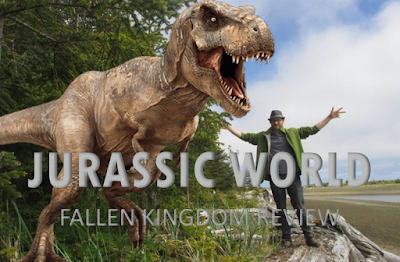Jurassic World: Fallen Kingdom was never going to be a good movie. The synopsis as presented in the trailers was much too ridiculous to work in any meaningful way. Whether it was going to be enjoyable in its sheer over-the-top indulgence or gruelling in its mundane plot and numbing action, it was going to be bad either way.
And that in and of itself is disappointing. Jurassic Park was possibly the perfect blockbuster, offering thrills and excitement as well as a compelling narrative bolstered by a brilliant science fiction concept, and engaging characters in equal measure. And none of its sequels have been near as good. Fallen Kingdom however, delivers a strong argument for being the worst one yet.
Three years after the incident at Jurassic World, a volcano on Isla Nublar is ready to erupt with all the remaining dinosaurs in its way. Now leading a Dinosaur Protection organization, Claire Dearing (Bryce Dallas Howard) is recruited by Eli Mills (Rafe Spall), the assistant to John Hammond’s former partner Benjamin Lockwood (James Cromwell) to help transport many of the dinosaurs to an island sanctuary; and to make sure they retrieve Blue, the last velociraptor, former raptor trainer Owen Grady (Chris Pratt) is roped into joining the expedition. But once on the island it becomes apparent there’s another, malicious reason they’re there.
That description may sound familiar to anyone who’s seen The Lost World, Steven Spielberg and Michael Crichton’s first sequel to Jurassic Park. There are a few details, such as the goal of extracting the dinosaurs, that are changed, and it’s a lot more high-octane with the volcano ticking clock, but it’s basically the same plot: conservationists try to thwart a greedy corporation exploiting the dinosaurs. It even has a lot of the same scene progression and story beats. But in truth, the movie is a retread of The Lost World for only its first half, after which it decides to repeat Jurassic World instead, with touches of Jurassic Park here and there, especially in its climax. Except for a subplot involving Lockwood’s granddaughter (Isabella Sermon), every story element is derivative from one of the prior instalments, which is terribly uninteresting. For all its faults, Jurassic World at least tried something different. It opened the park, it trained raptors, it created a hybrid dinosaur -the latter was a failed execution, but it was still something new. Here, they try a similar thing, and not only is it still dumb, but it’s not even novel. And homages to Jurassic Park would be welcome, but after everything else they just come off as grossly repetitive, especially with numerous replicas of exact shots and scenarios.
What doesn’t help is the fact that the characters are still poorly written and developed. Pratt and Howard have a repertoire but lack much personality. Claire is an animal rights activist all of a sudden and has more conviction than before, but is still fairly flat, while Pratt is pretty much just playing his typical shtick, which he’s good at, but doesn’t make him interesting. Justice Smith and Daniela Pineda play the main supporting roles, and are more or less the token millennials. They each have their moments, but for the most part Smith’s Franklin is characterized by nervousness, Pineda’s Zia is characterized by sarcasm, and they’re both characterized by quirkiness. Spall is this films’ Arliss Howard and is a pretty bland antagonist; B.D. Wong returns as Dr. Henry Wu, still much more morally grey than in the original film (though arguably more accurate to his book character), and Toby Jones and Ted Levine play villains because of course they do. However Cromwell, despite strangely going back and forth between an American and British accent (and practically wearing Hammond’s nightgown from Lost World), has immediate power of presence, as does the eminently wonderful Geraldine Chaplin as his housekeeper. And I’ll warn you that though the advertising emphasizes Jeff Goldblum’s return as Ian Malcolm, his screen-time is barely two minutes.
One area it can’t be denied the movie does succeed at is that the dinosaurs look a lot better than in Jurassic World. There are still some scenes where they’re painfully computer-generated, primarily the dinosaur that features in the climax, but there are also a lot of scenes where either a practical model is being used or the CGI is a lot more polished. There’s definitely substance to most of the human-dinosaur interactions. Also, the movie builds tension very well, probably owing to director J.A. Bayona’s experience in the horror genre with The Orphanage and Penny Dreadful. However this is offset by the fact that none of the deaths are surprising or undeserved. Everyone you expect will survive in this movie is probably safe.
There’s a point to Jurassic World: Fallen Kingdom: a specific endgame the filmmakers wanted to get to, and one that is genuinely intriguing. However to reach it they decided to just soullessly recycle what already hadn’t really worked in sequels past. There are a handful of good moments in this movie, interesting set pieces, and enough diverse dinosaurs for dinosaur lovers to get a kick out of. But it’s as if Universal heard the complaints that Jurassic World didn’t live up to Jurassic Park, so decided to retaliate by eliminating what originality Jurassic World had in favour of just copying the Spielberg films in a slightly different context. The result is a hollow, insipid movie that even a T-Rex can’t save.
Letterboxd: https://letterboxd.com/jbosch/

Comments
Post a Comment